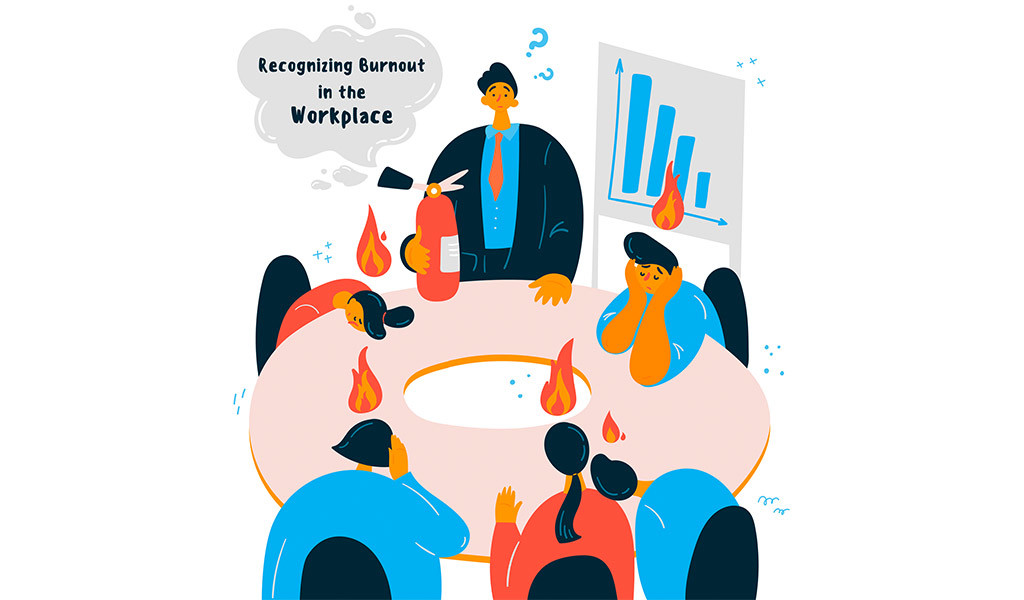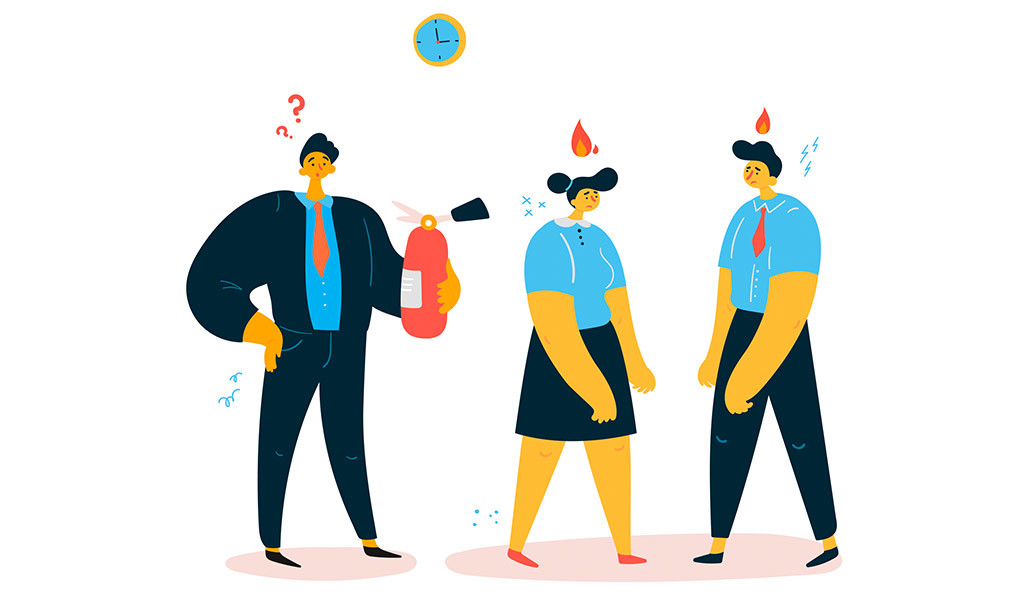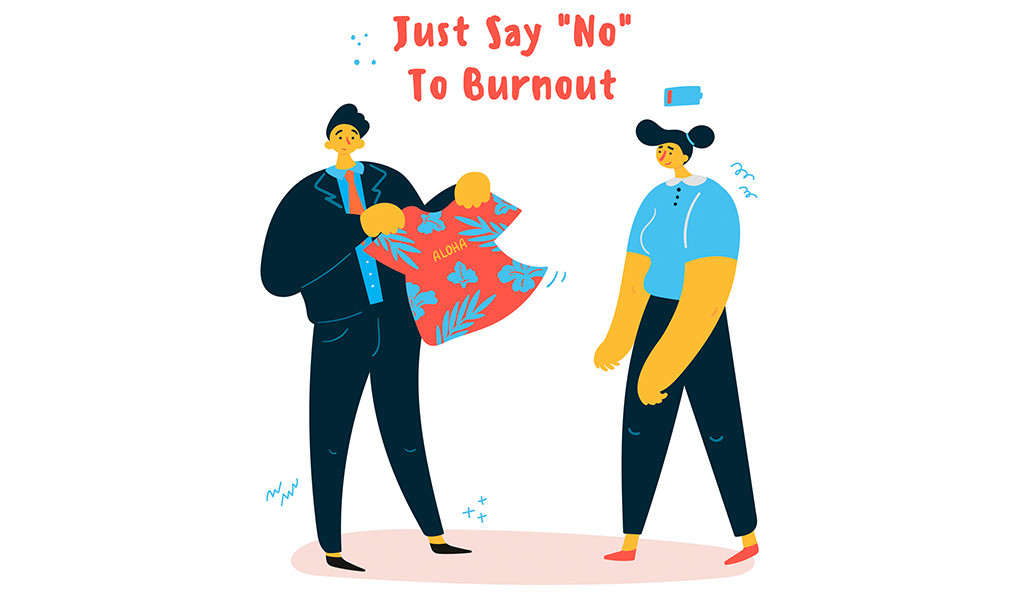
Burnout is a relatively new term in the business world but it’s gaining more and more attention every day. So, what is burnout? “Burnout” is now officially recognized by the World Health Organization and is defined as “chronic workplace stress that has not been successfully managed”. Burnout is tough on the employees who experience it, but it’s also tough on businesses too. Employees experiencing burnout are less productive, more likely to be absent from work, are more likely to leave, and much more.
There’s been a distinct shift in recent years in how to tackle burnout. Some organizations would shift the blame of burnout onto the employees. Maybe they just need to be more efficient? Maybe they need to seek help outside of work? Maybe they need to manage their time better? However, burnout doesn’t happen by accident. It’s usually a culmination of several workplace factors that come together and create a harsh working environment for employees. Put simply, the problem isn’t the employees, it’s the business.
Some jobs are inherently more stressful than others and customer service jobs fall into the “very stressful” category. Customer service agents are often under extreme time pressures, have to deal with complex problems, and often rude customers. Their role is to help customers, and these customers are usually calling because they are unhappy. This sets the tone of the interaction from the beginning and it’s for the agent to turn the interaction around. There are plenty of great customer service agents who are experts at this, but it doesn’t make the job any less stressful.
Here we want to look at why customer service agents burnout and how you can fix it so your business can continue to excel. Let’s get started.
The Negative Effects of Customer Service Agent Burnout
Burnout is inherently negative, so you might be wondering why this warrants its own section. Well, we’re interested in breaking down the effects of burnout on the business in a scientific way. This means that all negative effects must be accounted for as well as how they cause issues for the business operation. Let’s take a look.
Reduced Productivity
Stressed and burned out employees become less productive. When you’re feeling stressed and overworked, there’s often little room left in your brain to think on your feet, act quickly, and stay focused. Instead, you start to lose focus and become less productive. Less productive workers mean a less productive business.
Increase In Errors
A key part of any customer service job is to capture customer data. This might be in the form of editing customer information, setting up accounts, making tweaks to orders, and so on. A small error can lead to big problems in some cases. Getting one digit wrong in a customer’s name can result in countless communications in the future that have the wrong information. Customers want to feel valued by the company and nothing makes a customer feel less valued than not even getting their name right. A small error in an address can lead to orders getting sent to the wrong location, which will result in very unhappy customers and even more calls to the customer service team.
Agents experiencing burnout aren’t working with the same mental capacity as agents who are happy and fulfilled in their roles. They are more likely to make errors and are also less likely to spot errors they have made when proofreading.
High Frustration Levels
Burned-out employees are more likely to be frustrated and take this frustration out on customers. This doesn’t necessarily mean that every agent who experiences burnout will suddenly start being rude and aggressive to customers. However, this frustration can come out in different ways. They may feel unmotivated to help a customer who is being difficult or impolite. They may try to limit the communication to just the bare minimum, or even be passive-aggressive. This can all be disastrous when your goal is to improve the customer experience.
Lack of Enthusiasm
Stressed employees become unenthusiastic about their work because their work is the source of their stress. This lack of enthusiasm will harm their work, but it will also harm the employees around them. Enthusiasm has a way of spreading from person to person and increasing morale. The same is also true for negative emotions – they can spread throughout the team and decrease morale.
Absenteeism
An Australian study found that on average employees take an estimated 7.4 sick days per year, but for call center employees, this was roughly 8.2 days. It’s difficult to pinpoint the exact reasons for absenteeism in call centers because the answer would rely on getting reliable and honest data from agents. However, agents in workplaces where they feel they need to take more time off are less likely to feel comfortable telling the company why. It’s thought the leading causes are high stress, harassment, and childcare issues. Call center employees have traditionally had a very rigid shift pattern and working hours. This can make it difficult for employees to handle unexpected events in their personal life like childcare issues or personal appointments.
Absenteeism is undoubtedly bad for businesses. It puts increased pressure on the other staff and makes the operation less productive as a whole.

10 Reasons why Customer Service Agents Burnout
So now we know the negative effects of burnout, let’s look at the leading causes of it.
1. Insufficient Training
Call centers are often busy workspaces that are under immense amounts of pressure to always be available and be adequately staffed. This means that training can sometimes be overlooked. Well trained staff are more resilient in stressful situations because they learn exactly how they should handle them. Employees are less likely to be caught off guard and make mistakes when they are well trained.
2. Poor Workplace Technology
The customer service agent’s job is made harder by poor technology that makes handling queries more frustrating for both employees and customers. Tension can rise in a call when the customer has to wait for a slow system to respond, or for the employee to manage switching between systems. Old and outdated technology increases frustration for employees by making their tasks harder to achieve and by making them feel undervalued by the company. Managers often overlook the effect antiquated technology has on the call center operation and think that it’s the employee’s responsibility to increase efficiency when that may not be possible.
3. Lack of Recognition
Customer service roles can be extremely challenging, and employees often feel they are not adequately recognized for their work. Call center managers are often focused on KPIs and driving up the statistics to produce glossy reports. This constant focus on what more can be done to improve often leaves little time for employees to be praised for the work they do.
4. Poor Compensation
Customer Service Jobs often pay poorly or offer little in the way of benefits. This is changing as companies recognize the valuable role customer service agents play in the business, and as the agent skill set becomes more diverse. However, many agents are still paid below market rates for a high-stress job.
5. Lack of Career Progression
Customer service agents often become demotivated if they can’t see a clear career progression path for them. If you’re in a stressful job and working under high pressure, it’s only natural to wonder what you can do to move up.
6. Repetitive Work
Agents often have to perform the same tasks over and over. This can leave them feeling under stimulated and demotivated in their job. All people enjoy having a sense of agency in their role, and when the workplace tasks are too restrictive, there’s no room for creativity and agency.
7. Stringent Policies and Procedures
All workplaces need policies and procedures to keep the operation running smoothly. However, they shouldn’t be used to constantly scrutinize employees on their performance to the point where they feel unmotivated to work. Being too critical of agent performance can lead to agents being in a constant state of anxiety where they are even more likely to perform poorly.
8. Poor Management
All teams perform better under a good manager, and the opposite is also true for a bad manager. Some managers put too much pressure on agents and lack a deep understanding of the day to day pressures of the job. This can lead to a breakdown in communication between managers and agents which affects morale and productivity.
9. Difficult Customers
All agents will have to deal with difficult and angry customers, and usually every day. While agents tend to be hired for their resilience to angry customers, they are still human. Naturally, agents will sometimes become overwhelmed or depressed by interactions with difficult customers and this will affect their performance.
10. The Volume of Work
Call centers are busy places that often experience huge volumes of customer queries. This can lead to agents feeling overworked and overstressed, making them feel mentally and emotionally exhausted.

How To Fix Burnout
Implement a Robust and Continuous Training Program
Training isn’t just for new employees, it’s for everyone. Training should be an ongoing process where employees are continually coached in core skills and given new skills as more information becomes available. One study found that call center employees rated their training program as 96% effective. However, under testing, they scored around 86% for effectiveness. Additionally, only a month later, this dropped to 77%.
Invest in New Customer Service Technology
There are many great options available that make the employee’s job easier, and as a result, drive more success for the business. Moving to an Omnichannel platform can dramatically improve workplace efficiency and productivity because less time is lost by employees changing from system to system during a call.
Omnichannel platforms also reduce the likelihood of errors because all information is only captured once – there’s no repetitive handling of data that opens the doors to small errors or even lost data. Investing in alternative customer service solutions like Live Chat and Chatbots will also take the pressure off the call center operation and allow agents to multitask more easily. These messaging platforms also reduce the volume of calls coming through because simpler problems can be handled by chatbots.
Give Agents More Control
Trust your agents to take control of interactions and solve problems creatively. Sticking to a rigid script can lead to boredom and a lack of fulfillment for employees. Even when they successfully help a customer, they can be left feeling that it wasn’t really them who achieved this – it was the script. Allow agents to go off-script and bring their own personality to the role.
Wherever possible, avoid micromanaging your employees. No one likes to feel watched constantly or having their every move analyzed.
Motivate Your Employees
There needs to be a positive atmosphere in the customer service operation. This means you should find ways to motivate your employees through praise and positivity. You can do this by:
- Rewarding employees who demonstrate the skills you want to encourage. Did an agent find a creative solution to a problem? Give them an award, a small bonus, let them go early, or give them a treat.
- Provide feedback, but always focus on the positives as well as the negatives.
- Hold team meetings regularly so the team can bond with each other and with the manager.
Be Flexible Where Possible
Agents appreciate having a more flexible work schedule where they can maintain a better work-life balance. Allow a range of shift patterns and allow agents greater freedom to choose which shift they want rather than boxing them into whatever shift they pick the first time you ask them. Also, allow them to be themselves and feel comfortable in the workplace. This means allowing them to dress more casually, listen to music where appropriate, and organize social events for the team.
Offer Performance Incentives and Bonuses
Customer service agents are contributing to the success of your company so they should be rewarded for this. You should offer performance-based incentives that are realistic to motivate employees. You should also assess whether your incentives are appropriate. Do they fairly compensate your employees? Do you think they’re working? Would higher incentives work better?